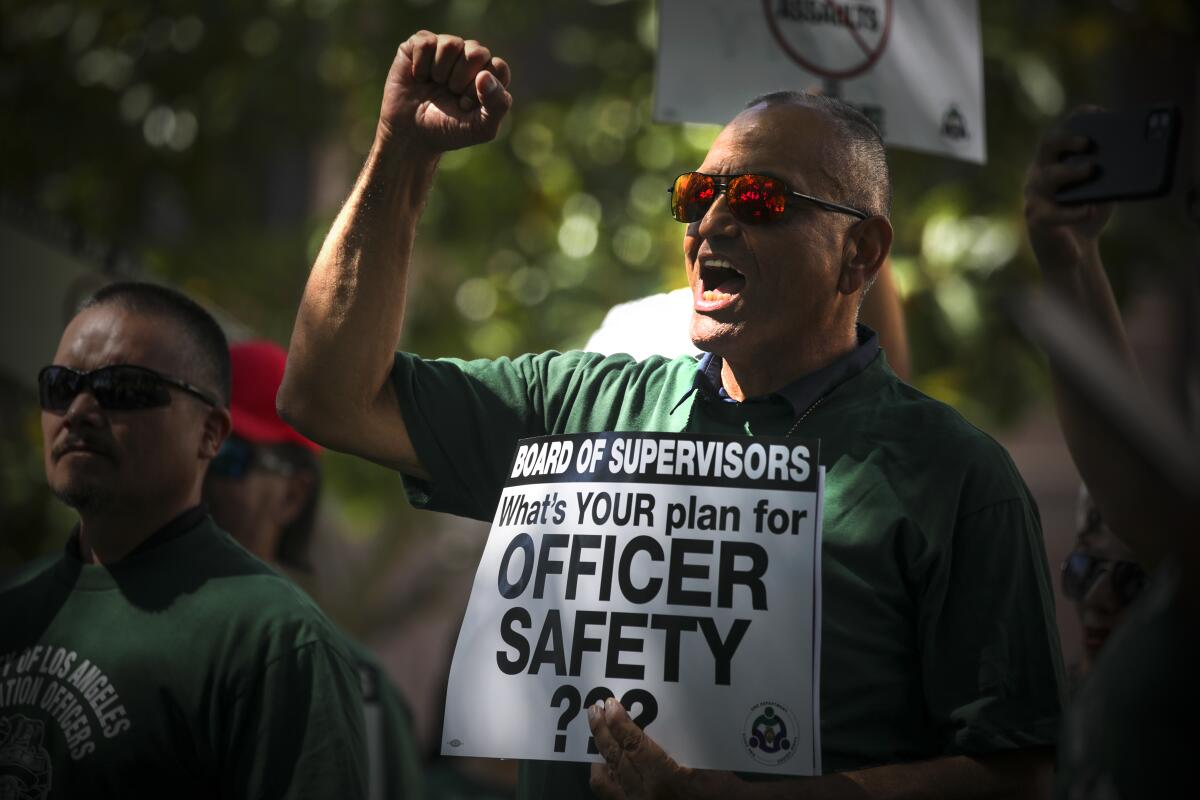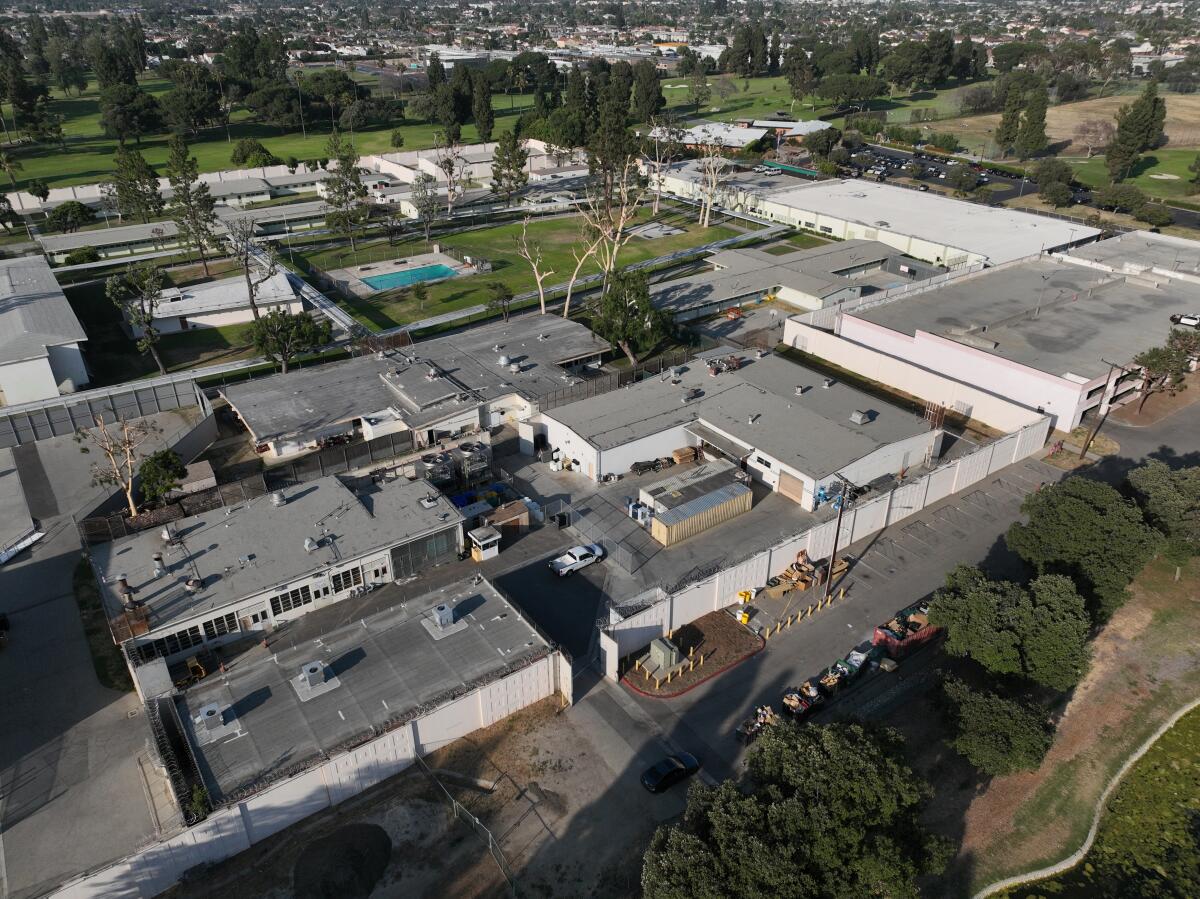As L.A. County juvenile halls become more violent, many officers are skipping work

- Share via
On the night that a young person stole a key, scaled a wall and briefly escaped, 100 probation officers were scheduled to work at Los Padrinos Juvenile Hall.
About 60 of them never showed up.
Even after two dozen additional officers arrived, the staffing remained “dangerously low,” enabling the chaotic escape on Nov. 4, according to a report by the Los Angeles County inspector general’s office.
That Saturday wasn’t an outlier.
Across the three shifts at Los Padrinos that day, 103 probation officers — including the 60 or so on the “p.m.” shift — called out, meaning they were scheduled to work but never showed up. The next day, 101 officers called out, according to numbers released by the L.A. County Probation Department to The Times last month.
Callouts at the Downey facility surged past 100 for the next two weekends — and most holidays, according to the department records. On Thanksgiving, 112 probation officers skipped their shifts, while 113 called out on Christmas Eve. On New Year’s Eve, 117 didn’t show up — same with New Year’s Day.
The Probation Department did not say how many were scheduled to work each of those days. But a staffing analysis by the department at the start of this year suggests that the callouts represented a significant chunk.
Generally about 250 officers, distributed among the three shifts, are needed to safely staff Los Padrinos at a population of about 300 juveniles, according to the analysis (280 to 300 juveniles typically live at the facility). A hundred officers calling out would mean that 40% didn’t show up.
“I have to be very frank about this: There’s a callout culture,” L.A. County Probation Chief Guillermo Viera Rosa, who took the top job last year, told county supervisors at a meeting in May. “The level of callout is just something so extraordinary that exists nowhere else.”
The department disputed the inspector general’s findings and said its records showed that only 20 people missed their shifts the evening of the breakout. According to the inspector’s report, 40 people warned their supervisors they wouldn’t show up, and 20 skipped without the heads-up.
The problem, some staffers say, stems from violence inside the juvenile halls — fights among the youths, which staffers are supposed to break up, as well as aggression directed at staffers — which makes many dread coming to work. The county’s leave policy is generous, giving many staffers a large reserve of sick days they can use to skip a shift.
It’s a vicious cycle. With fewer staffers, the halls become even more dangerous — and the reasons to call out more compelling. Officers are sometimes required to stay for a double shift to address last-minute staffing problems, exhausting them and ruining whatever plans they had for the day. To fill the gaps, the county paid tens of millions in overtime last year.
“The No. 1 issue is violence,” said Jitahadi Imara, head of the Black Probation Officers Assn. “They’ve failed to address that issue ... so you’re going to have callouts.”
The callouts further diminish the already small pool of officers who staff the county’s two juvenile halls. Of the 540 assigned to Los Padrinos this month, half were on family or medical leave for at least part of the month, according to Probation Department records.
Like his predecessors, Viera Rosa has spent his first year on the job desperately trying to get his employees back to work. He has disciplined many, fired a few and flooded the halls with staffers from different parts of the agency.
Daily callout numbers have improved. But every day at Los Padrinos, dozens of officers who are scheduled to work still do not show up, according to records, wreaking chaos for both a bare-bones staff and the incarcerated youths. Within the last year, a county oversight group found that youths were sometimes waiting hours to see their attorneys, stuck “in pain for days” awaiting medical treatment and forced to skip classes — all because there was not enough staff to escort them.
“I cannot tell a lie,” Viera Rosa, who previously worked in the state corrections system, told his bosses at the May meeting. “It is still at a level that is unacceptable, embarrassing to me personally.”

The staffing problems have placed L.A. County’s juvenile justice system, the largest in the country, repeatedly in the crosshairs of the state oversight board, which shut down two juvenile halls last year over unsafe conditions. The same problems soon cropped up at Los Padrinos, which was opened to take in nearly 300 incarcerated boys and girls, many of whom were awaiting court dates for crimes such as theft and assault, from the closed facilities.
Maya Ocasio, 18, who was incarcerated at Los Padrinos last summer, said the explanation for the copious amounts of time she spent in her cell boiled down to staffing.
“There was a time where we didn’t get out of our rooms until close to dinner time. ... They’d say, ‘Sorry we couldn’t do anything. The staff isn’t here. It’s only me right now,’” Ocasio said. “Look, I’m OK with being alone, but being in a cell for that long, you go ... crazy.”
L.A. County Inspector General Max Huntsman, who wrote the report on the Nov. 4 breakout, said both agencies he monitors — the sheriff’s and probation departments — have struggled to fill their ranks. But probation, he said, is unique. Staff “just don’t show up” — and it’s pretty obvious why.
“People say, ‘I’m not coming in because I don’t like the environment there,’” he said. “Everybody knows why they’re doing it. They announce it.”
From Los Padrinos’ mid-July opening date through the first of March, there was an average of one assault, either actual or attempted, on probation officers per day, according to documents obtained through a public records request. Officers reported an average of nearly 40 fights among the young people per week.
A 14-year-old who was at Los Padrinos through December said fights — and the pepper spray that officers used to break them up — were a near daily occurrence. She said girls got used to dousing themselves in milk, the only thing that could calm a searing throat post-pepper spray.
“When they know they’re going to fight, they would save milk all day,” she said. “There was no control there.”
Chief Deputy Kimberly Epps said at a public meeting this month that there has been an uptick in violence at Los Padrinos and that the staff was working on a “violence reduction plan.” On Monday morning, officers used pepper spray at Los Padrinos after a “major disturbance” involving 36 youths, the department said, adding that no one was badly injured.
Often, probation officers will give their supervisor a heads-up that they’re not coming in that shift and request to use a sick day. Other times, officers will just not show up, with no advance notice.
Some have done this so often that probation officials say they have essentially dropped off the grid. Managers have started an “attendance project” to track down employees with a history of not showing up and have purged the ranks of some egregious offenders. The department spokesperson said anyone who misses work without a valid excuse has their pay docked.
A department spokesperson told The Times that 87 employees have been suspended for attendance-related issues since May 2023, and six have been fired.
“We have ... hundreds of staff that are no-shows, no calls, and that has been on the books, if you will, for many years,” Epps said at a public meeting in February. “We’re systematically working through that list and terminating people for not coming to work.”
Since last summer, managers have scheduled extra staffers to build a cushion for callouts, particularly on days where they’re braced for absences, such as Super Bowl Sunday. The department is actively recruiting new hires for the juvenile halls, with salaries for some officers starting at $64,000 to $78,000.
In the last two years, the Probation Department’s overtime spending has more than quadrupled, according to salary records. In 2021, it spent just under $12 million on overtime for all employees. Last year, the figure was over $57 million.
Mark Young, a deputy probation officer, made the most in overtime, taking home about $270,000 last year on top of his $128,000 base salary. The department said the ballooning overtime was, in part, to compensate officers who worked beyond their normal shifts so the juvenile halls could continue to operate.
“There’s just a domino effect,” said Eduardo Mundo, head of the Probation Oversight Commission, a county-appointed watchdog for the department.
When he spoke with The Times, Mundo was on his way home from an inspection of Los Padrinos, where he chatted with an officer who had worked 70 hours of overtime in the last two weeks. That would amount to double shifts nearly every day.

When Jerry Powers got the probation department’s top job in 2011, the number of staff on medical leave bordered on farcical. One-tenth of his workforce couldn’t work.
But he suspected many really could. Falling out of chairs was a common workplace injury at the time, he said. One officer too injured to work was discovered to have a second job as a stunt double. Staff routinely forged their own doctor’s notes. The legitimate ones were just as unnerving.
“We had people who would come in with doctor’s notes that said, ‘Can’t work with juveniles,’” recalled Powers, who headed the department from 2011 to 2015.
Desperate, Powers tapped sheriff’s deputies to show up at staffers’ homes, urging them to return.
It worked for a while. The number of probation staffers on medical leave started to shrink. Then, people stopped showing up for their shifts.
“When you push on the balloon, it just bulges in other directions,” Powers said. “We had a whole running tug-of-war with the concept of not working.”
A decade later, Viera Rosa is still trying to wrest back control.
The department declined to make him available for an interview but said in a statement that his strategy has been a “game changer” for staffing levels.
Numbers released to The Times by the department show that in November, the month the breakout occurred, an average of 83 probation officers at Los Padrinos called out each day — weekends were typically higher. As of this May, 47 officers called out each day, on average.
At Barry J. Nidorf, the Sylmar facility that houses a smaller juvenile population accused of more serious crimes, 27 probation officers called out per day on average in November. As of this May, about 12 were calling out each day.
Perhaps Viera Rosa’s most controversial staffing move came in February when he ordered hundreds of officers who typically work in the field with people on probation to do two-month stints at juvenile halls. Those who couldn’t do the work for medical reasons were required to stay home and use their leave time.
About one-fifth of the callouts at Los Padrinos and Nidorf last month came from staffers on the temporary stints.
The union representing deputy probation officers decried Viera Rosa’s decision, calling it dangerous and short-sighted, since it left fewer people to monitor probationers. Union president Stacy Ford declined to comment, saying he didn’t want to be quoted in negative stories.
Hundreds of probation officers, meanwhile, are part of a class-action lawsuit filed in March that accuses probation officials of discriminating against workers with injuries, according to the attorney for the plaintiffs. In an “absurd solution to this staffing shortfall,” the lawsuit said, the department assigned the most physically demanding positions to those least equipped for them.
Arnold Peter, the attorney for the class action, said many of his clients are working jobs in the juvenile halls that they’re not physically prepared or trained for. Others, he said, are forced to do nothing.
“They’re just sitting at home on their hands,” Peter said. “It’s just irrational. By having people not come in at all, they’re just exacerbating the situation by the day.”
Mira Hashmall, an attorney representing the county, said the lawsuit should be dismissed and noted that the court has not certified it as a class action.
Powers, the former probation chief, was also sued by his staff and accused by the main union of generating a “public safety crisis” by trying to persuade officers to work.
“Culture change is not a light switch,” he said. “It’s like sitting in a rowboat and trying to change the direction of the Queen Mary.”
More to Read
Sign up for This Evening's Big Stories
Catch up on the day with the 7 biggest L.A. Times stories in your inbox every weekday evening.
You may occasionally receive promotional content from the Los Angeles Times.











